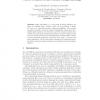Free Online Productivity Tools
i2Speak
i2Symbol
i2OCR
iTex2Img
iWeb2Print
iWeb2Shot
i2Type
iPdf2Split
iPdf2Merge
i2Bopomofo
i2Arabic
i2Style
i2Image
i2PDF
iLatex2Rtf
Sci2ools
107
click to vote
LATA
2009
Springer
2009
Springer
Nested Counters in Bit-Parallel String Matching
Many algorithms, e.g. in the field of string matching, are based on handling many counters, which can be performed in parallel, even on a sequential machine, using bit-parallelism. The recently presented technique of nested counters (Matryoshka counters) [1] is to handle small counters most of the time, and refer to larger counters periodically, when the small counters may get full, to prevent overflow. In this work, we present several non-trivial applications of Matryoshka counters in string matching algorithms, improving their worst- or average-case time complexities. The set of problems comprises (δ, α)-matching, matching with k insertions, episode matching, and matching under Levenshtein distance.
| Added | 26 Jul 2010 |
| Updated | 26 Jul 2010 |
| Type | Conference |
| Year | 2009 |
| Where | LATA |
| Authors | Kimmo Fredriksson, Szymon Grabowski |
Comments (0)

